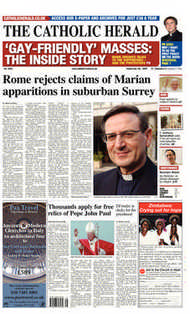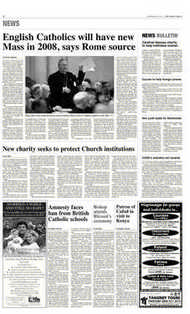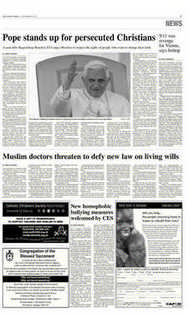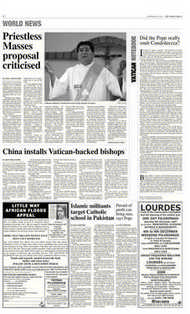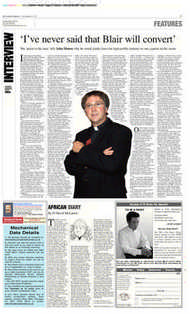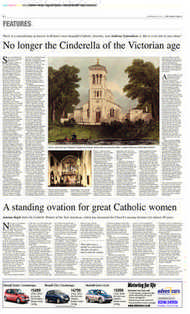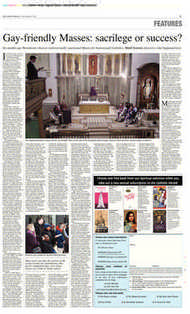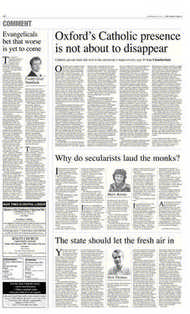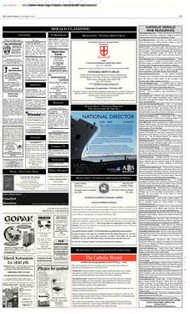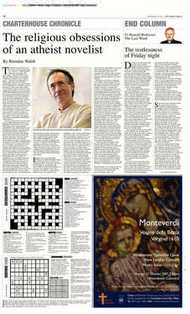Page 2, 28th September 2007
Page 2

Report an error
Noticed an error on this page?If you've noticed an error in this article please click here to report it.
Tags
Share
Related articles
English Bishops Request Secret Report From Latin Mass...
Icel Invokes Copyright Law To Order Mass Translation Off...
Deadlock Over People’s Parts In New English Mass
We Need A Miracle, Says Cardinal Newman's Postulator
Cardinal Hume Talks Clergy Through Rome Option
Speculation Mounts Over 'universal Indult' To...
English Catholics will have new Mass in 2008, says Rome source
BY PETER JENNINGS
THE LONG-ANTICIPATED new translation of the Order of Mass is now almost complete and will be ready for 2008.
A senior source in Rome, who wishes to remain anonymous, revealed this week that the new English text of the Ordo Missae had taken a huge step forward with the news that the bishops’ conference of India finally approved the draft text in a vote.
The conference was the last of the 11 members of the International Commission on English in the Liturgy (ICEL) to formally answer the Congregation for Divine Worship’s request for responses to a draft text submitted two years ago.
In June 2005 considerable publicity surrounded a vote taken on the same text by the United States bishops’ conference.
The American bishops voted on the translation after listening to a lecture from Bishop Arthur Roche of Leeds, chairman of ICEL. They proposed and approved roughly 60 modifications.
The Bishops’ Conference of England and Wales approved the text without proposing any changes and returned it to Rome.
The Indian vote effectively concludes the consultation phase involving different English-speaking bishops’ conferences from around the world. Various conferences have suggested a large number of modifications. It is thought that their responses have generally been looked on favourably by Vatican authorities, who are now expected to make an announcement about the arrival of the new translation before Christmas this year.
In their response the Indian bishops not only seconded some of the American bish ops’ proposals but also issued a number of their own points, highlighting parts of the translation that they felt could benefit from further theological reflection and study.
This will be the first part of the new English Missal to reach a final version almost six years after the publication of the new Latin text at Easter 2002. The progress of the remaining sections of the new English Missal is less certain.
Although most of the initial draft texts have now been completed and circulated to the bishops’ conferences, the delay by ICEL has been such that the proposed date for the conclusion of the consultations has been shoved back several times.
A spokesman for the English and Welsh bishops’ liturgy department said he did not know about the Indian conference’s vote on the text. “All we can say is that the translation is with Rome and it appears to be making good progress,” he said.
English-speaking Catholics have been expecting a new translation of the missal for years, but there have been several sticking points that have caused confusion and delay. One of the concerns often raised about the new missal has been the ecumenical repercussions of changing parts of the vernacular liturgy that Catholics share with other English-speaking Christians, including the Credo, the Gloria and the Sanctus.
Other obstacles have included the “people’s parts” of the Mass. There has been a heated debate over the response to the priest’s opening words at the beginning of Mass when priests say: “The Lord be with you.” Congregations currently reply: “And also with you”. In the new translation, in an attempt to be more faithful to the Latin, the response has been changed to: “And with your spirit.” There was also a disagreement over the theological implications of the new translation of Eucharistic prayer, which says that Jesus Christ’s blood was shed “for many” – pro multis – rather than “for all”.
Critics of the current missal, which uses “for all”, say that the phrase gives the impression that all men are saved regardless of their relationship to Christ or the Church.
But the word “many” is also controversial, as it could imply that not all people are saved through the redemptive power of the Christ’s death and resurrection and that some men and women will not enter the kingdom of heaven.
blog comments powered by Disqus


